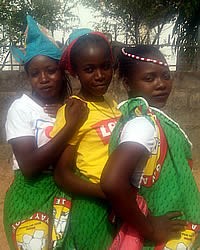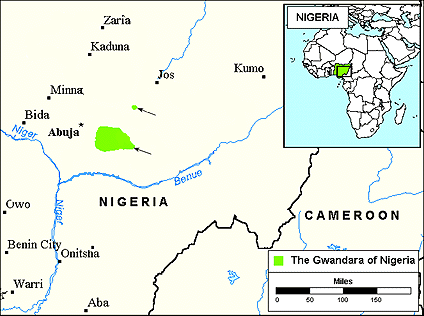Gwandara history relates that Islam was introduced into Kano in the fourteenth century. However, Gwandara, the younger brother of the ruling chief refused to convert to Islam. After a warning by the chief to convert or be enslaved, Gwandara took his followers and traveled southward to Gwagwa. Subsequent Muslim attacks led to yet another dispersion farther south. The Gwandara finally settled in the Jukun territory during the seventeenth and eighteenth centuries. Jukun had become a type of refugee zone for diverse peoples also fleeing their communities for various reasons, with the Gwandara dominating politically in the region for many years. Gwandara people now live mainly in the Akwaja, Lafia, Keffi, and Nassarawa divisions of what was Nigeria's Plateau Province. In 1996 the Nasawara state was created which includes those divisions where Gwandara live. They are often found in Kano, a major city in northern Nigeria. Traditionally, they were grouped with the Hausa people, so they have a connection with this huge people group.
Gwandara people have lived in close contact with diverse ethnic groups in the Benue basin region and culturally resemble both the Gwari and Yeskwa peoples. They often marry the Yeskwa tribe; however, their dances and religion are similar to those of the Arago people. Most Gwandara are subsistence farmers with their farms located in the bush outside of their villages. They build huts in a circle to form the compound that houses an extended family. There is only one entrance into each compound because each hut is connected to the next by a corn bin or granary. Each village has a chief who is responsible for handling village affairs and settling village disputes. Gwandara men usually wear Hausa-style gowns. Most women wear cloths, although some wear loose strings around their hips with bundles of leaves hanging in front and in back. Palm oil is important to the Gwandara because of its many uses. Therefore, a fair amount of it is obtained and kept in each village or sold in markets. Another major product sold in the market is mats. Each mat takes four days to make. Beer and tobacco are both important in Gwandara life, however, most Gwandara neither smoke pipes nor drink in excess like many other groups in this part of Africa. Young Gwandara men work on their fathers' farms until they marry, which is usually around age seventeen or older. Girls are betrothed as young children, but before reaching marriageable age, they have the right to break off the engagement, in which case the bride price is returned to the suitor. Ritual dances are an important aspect of the Gwandara ethnic religious society.
Ethnic religions are deeply rooted in this people's ethnic identity, and conversion essentially equates to cultural assimilation or even betrayal. Gwandara people worshiped by sacrificing goats and sheep. Lesser gods for each village were also worshiped, usually in open circular spaces inside groves approached through avenues of palms. Each village has two temples, which are essentially mud huts containing the village god.
The greatest need of Gwandara people is to understand the infinite love and provision of the one Almighty God who has paid the full penalty for all their sins through his son, Jesus Christ. Bible translation has begun, and some audio resources have been recorded in the Guandara language, but no viable efforts have been made to reach this people group.
Ask the Holy Spirit to prepare the hearts of the Gwandara people for the gospel. Pray that village chiefs and family heads will be drawn by the Holy Spirit to seek the only Savior and that families will follow. Pray for an abundant harvest among the Gwandara people as a testimony of the Lord's power and goodness.
Scripture Prayers for the Gwandara in Nigeria.
| Profile Source: Joshua Project |











